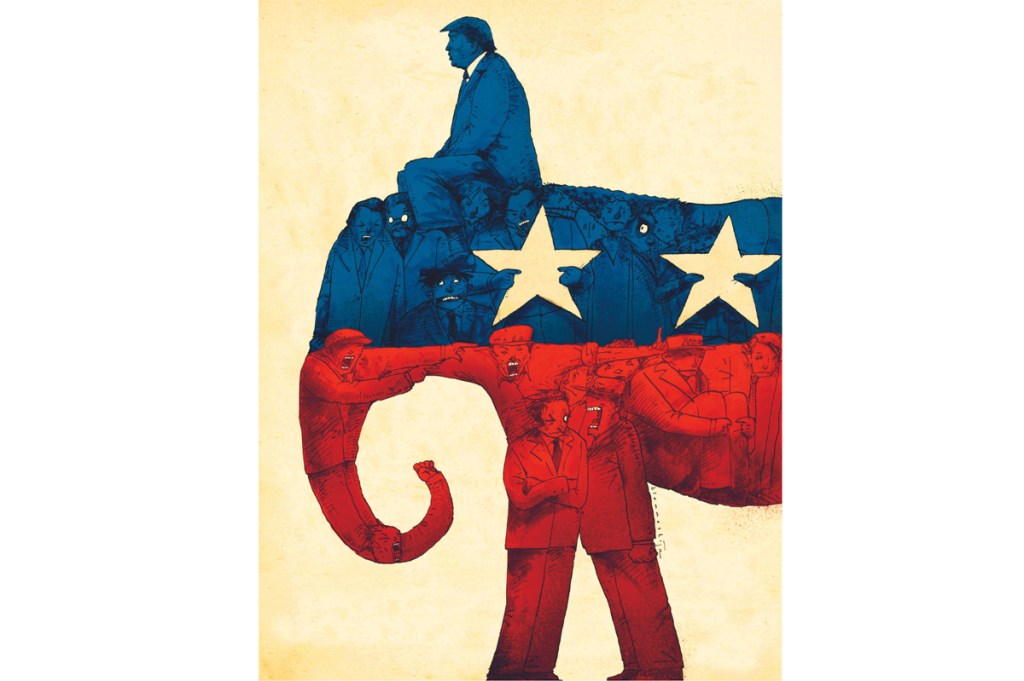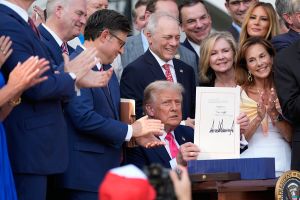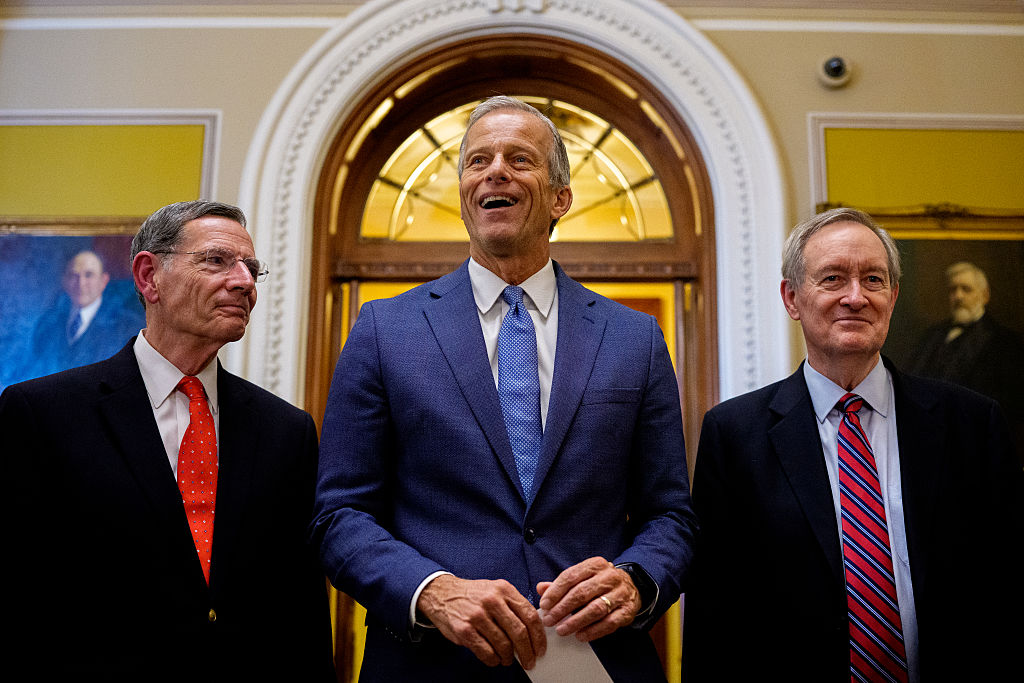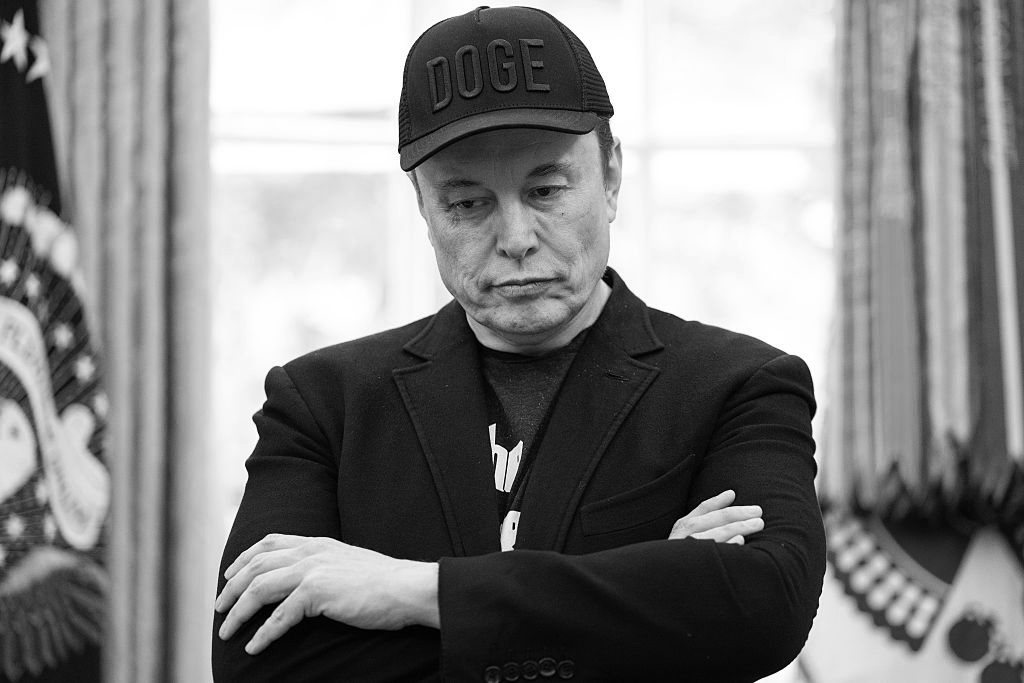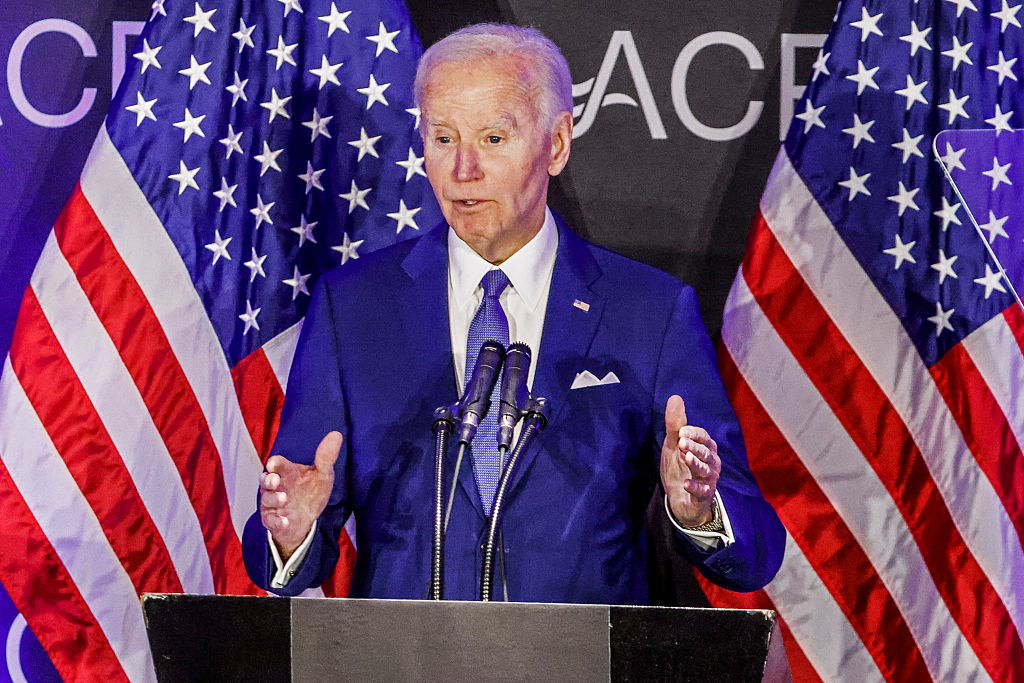Open any national publication, and you’ll read all about a cultish, fire-breathing MAGA majority in the Republican Party, slavish in its devotion to Donald Trump. Nothing will shake their conviction that Trump was the rightful winner of the 2020 election. This is the group that fumbled the ball on the one-yard line in the 2022 midterms, nominating unelectable kooks who could not perform the most basic of political tasks: winning undivided control of Congress amid 8 percent inflation that Americans largely blamed on the incumbent Democratic president.
And now they’re poised to do it again. The front-runner for the Republican nomination in 2024 is (at present) the twice-indicted Donald Trump. Every time he runs his mouth on national television, he proceeds to further incriminate himself. And his numbers only seem to go up with each new criminal allegation against him.
Viewed in terms of personalities and protagonists, Republican politics in the last eight years has been, pardon my language, a complete and total shitshow. Much turned on the decision by the host of The Celebrity Apprentice to seek the presidency in 2016 and we’re still living with the consequences of that decision. But if you look beneath the surface, examining tribal divisions that produced Trump and sustain him today, you’ll find that the Republican electorate that produced this maddening result is, by and large, the same as the one that produced the milquetoast establishment nominees of yesteryear.
The press likes to remind us that the Republican coalition is unbendingly conservative, in contrast to the ideological flexibility we often see from the Democrats. And it is true that something like eight in ten Republicans call themselves conservatives, compared to a bare majority of Democrats who call themselves liberals. But for the primary fight at hand, the fact that this conservative supermajority exists hardly matters. It rules out the likes of Larry Hogan and Chris Sununu from the get-go, but decides little else. Donald Trump and Ron DeSantis and Tim Scott and Nikki Haley and nearly all the other contenders can plausibly call themselves “conservative,” and yet we can all grasp that a Donald Trump victory would mean something markedly different from a Tim Scott one.
Politics is often the task of dividing roughly in half, and that is true of the contests for power within the parties themselves. Ideologically, the fault line within the GOP lies between those who would identify themselves in surveys as “very conservative” and everyone else. And personality-wise, the party is divided between the true Trump fans whose loyalty is to him over the party, and the party loyalists who view Trump as the temporary leader of it.
On paper, these divides suggest a party little changed since the days of Mitt Romney, John McCain and the Bush dynasty. The Republican Party is divided roughly in a 4:4:2 ratio between very conservative voters, the somewhat conservative, and a moderate-to-liberal remnant. Historically, the somewhat conservative and moderate voters have allied to control the nomination process.
Meanwhile, polling by Echelon Insights finds that hardcore Trump supporters — the ones who say they are Trump supporters first and Republicans second — number just 37 percent to the 53 percent who say they support the party first. The numbers of Trump loyalists have been in a slow, grinding decline ever since the dust settled from the 2020 election, though of course this has not stopped him from leading Republican primary polls with outright majorities.
Trump’s core support in these surveys comes from very conservative Republicans. Their favorability towards Trump has barely budged in the last several years, even in the wake of January 6 and the disastrous 2022 midterms. And Trump currently holds down between 70 to 80 percent support in this segment in a hypothetical head-to-head with Ron DeSantis. But the real story is the more moderate Republicans who, despite everything, have not rejected Trump and are currently split roughly evenly between him and an alternative. Their Trump favorability graph over the last several years looks more like an EKG readout, plummeting momentarily in the wake of outright embarrassments but always returning to its previous baseline. Trump’s majority support is owed at least in part to wayward moderates who always seem poised to wash their hands of him but always return. Their support looks like less cultishness than it does acquiescence.
But it is on the very conservative that Ron DeSantis has placed his bets. Despite Trump’s current dominance in this group, they have previously proven to be the most volatile in the race between him and DeSantis, whom they also perceive as very conservative, like themselves. After Trump’s candidates face-planted in the midterms, DeSantis briefly managed to draw even among the very conservative crowd, and he’s betting that if he can stay well liked with this cohort, he’ll get them back if things break his way in Iowa. And whether such an outcome is likely or not, both the Trump and DeSantis camps accurately perceive these highly attuned voters as the real battleground. They like both men and are actively considering supporting the largest number of different candidates.
The more traditional pathway to the nomination is being followed by the South Carolinians Scott and Haley: position yourself as the top choice for the 60 percent of the party that is not very conservative, keeping your fingers crossed that the further-right candidates destroy each other.
Our polling shows a certain logic to this: somewhat conservative Republicans seem to have more in common with moderate ones than they do with the very conservative group. In a recent survey, we asked whether Republicans thought the party needed to move more to the right or to the center to win in 2024. Very conservative Republicans naturally leaned more toward shifting right, 66 to 19 percent. But somewhat conservative Republicans said the party needed to move to the center, 62 percent to 25 percent, a number that was a bit higher than the 58 to 23 percent majority of moderate-to-liberal Republicans who said so. In many ways, these are numbers you’d expect to see if the party were still that of Romney or McCain.
But despite what these numbers say, it is very clearly no longer the old GOP. And the reason it is not is that in 2016 Trump did something that is still under-discussed: he was able to build a base among the furthest-right voters, and then, using his celebrity, to hoover up votes from lower-information moderates who largely tuned out the other campaigns and were exposed only to Trump. These voters are still an identifiable bloc in the Trump primary coalition.
We can see this lower-information cohort in a breakdown of the Republican primary electorate when we test fifteen different concerns with the language conservative voters might use themselves — from “wokeness” in schools and corporations, to racial and gender ideology, to socialism, to “soft on crime prosecutors,” to the US becoming too enmeshed in the war in Ukraine. And we find a solid core — 32 percent — who are extremely concerned about nearly everything, who are predominantly very conservative and most likely to be considering both Trump and DeSantis, but are backing the former president by a 3:1 margin. About a quarter of Republicans are simply a milder version of this, divided into two groups: 20 percent who tend to say they are merely very concerned about nearly all these topics, where Trump leads by a more modest twenty points, and a 6 percent splinter faction who are extremely concerned about most issues but reject the Trump-led attacks on fellow Republicans monkeying with Social Security and Medicare.
The largest remaining group are those we call MAGA Moderates, who are 20 percent of the party. They are not highly exercised about the outrage du jour, registering low levels of concern across issues (though they are slightly higher on Trumpian totems like Ukraine intervention or protecting entitlements). The MAGA Moderates follow conservative media at much lower rates, are considering the fewest number of candidates, are two-thirds female, and the least college-educated group. Trump currently leads a full Republican ballot with these voters with 57 percent, with, among his challengers, only DeSantis (barely) cracking double digits.
Missing from the picture so far is a faction much-talked about in the transformation of the country-club Republican Party to one of protectionism and challenging the power of major corporations. And yet the national populists (or NatPops) are hardly identifiable no matter how you slice the GOP electorate. How then is this trend in the party so influential, guiding the campaigns of both the frontrunner and his main challenger?
The answer, to some extent, is that this mix of views undergirds the entire party. Opposition to Social Security and Medicare cuts is not the transgressive view of a few rabblerousers challenging free market orthodoxy, but the dominant view within a party that is made up of the majority of entitlement-program beneficiaries. In March, nearly identical numbers of Trump-first and party-first Republicans — 71 and 72 percent respectively — agreed that “no matter what, cuts to Social Security and Medicare should not be considered when balancing the federal budget.”
National populism is not an identifiable bloc among voters in the same way it is among intellectuals, but this line of thinking is still influential because the party as a whole is NatPop Lite and likely has been long before Trump, embracing many economic populist ideas. But this support is not absolute: by twenty points, Republicans agree with the statement that “Americans are better off when the United States is seen as a strong leader around the world” as compared with “Americans are better off when the United States focuses on its own interests at home and lets the rest of the world take care of itself.” Populist Republicans have had some success in eroding support for military assistance to Ukraine, but the whole effort feels inorganic, subject to an immune response from many Republicans who remember when the party stood up against imperialism from Moscow.
The picture so far looks fairly grim for Trump alternatives, but there are some scenarios in which they might do well. It might go like this: DeSantis or someone else breaks through and wins an early state (most likely Iowa). Trump then loses a good chunk of the very conservative and very concerned, who have shown their willingness to shift rapidly in response to events before. Subsequently, a Trump challenger gets a look from the lower-information moderates who right now have only a surface-level understanding of the people running against him.
What might Trump’s rivals need to do to effect such an outcome? At some level, Trump’s support may fall along ideological fault lines, but even those furthest to the right are not keeping score on policy issues. Trump’s initial bromance with Tony Fauci and his recent tack to the left on abortion do register with some conservatives, but for the most part, sundry ideological transgressions like his embrace of red-flag gun laws or his signing a criminal justice reform statute don’t seem to matter. His fans simply can’t process the idea of Trump as a squeamish pushover, not the fighter they know.
What does register are misgivings about his personality: that he runs his mouth too much on social media (far and away the number one concern Republican voters voice about him) and that he has too much baggage to win a general election. In focus groups, even those Republicans who speak admiringly of Trump’s fighting spirit or go along with the most vocal 2020 election conspiracy theorists nonetheless voice concerns that his shtick is wearing thin, not with themselves of course, but with their swing-voting neighbors. And it’s a reminder of how many races are ultimately decided: not on issues, but on vibes. Trump coasted to the nomination in 2016 on “but he fights!” And a shift in the vibes, not a detailed recital of his policy transgressions, will be the only way he loses in 2024.
This article was originally published in The Spectator’s August 2023 World edition.



